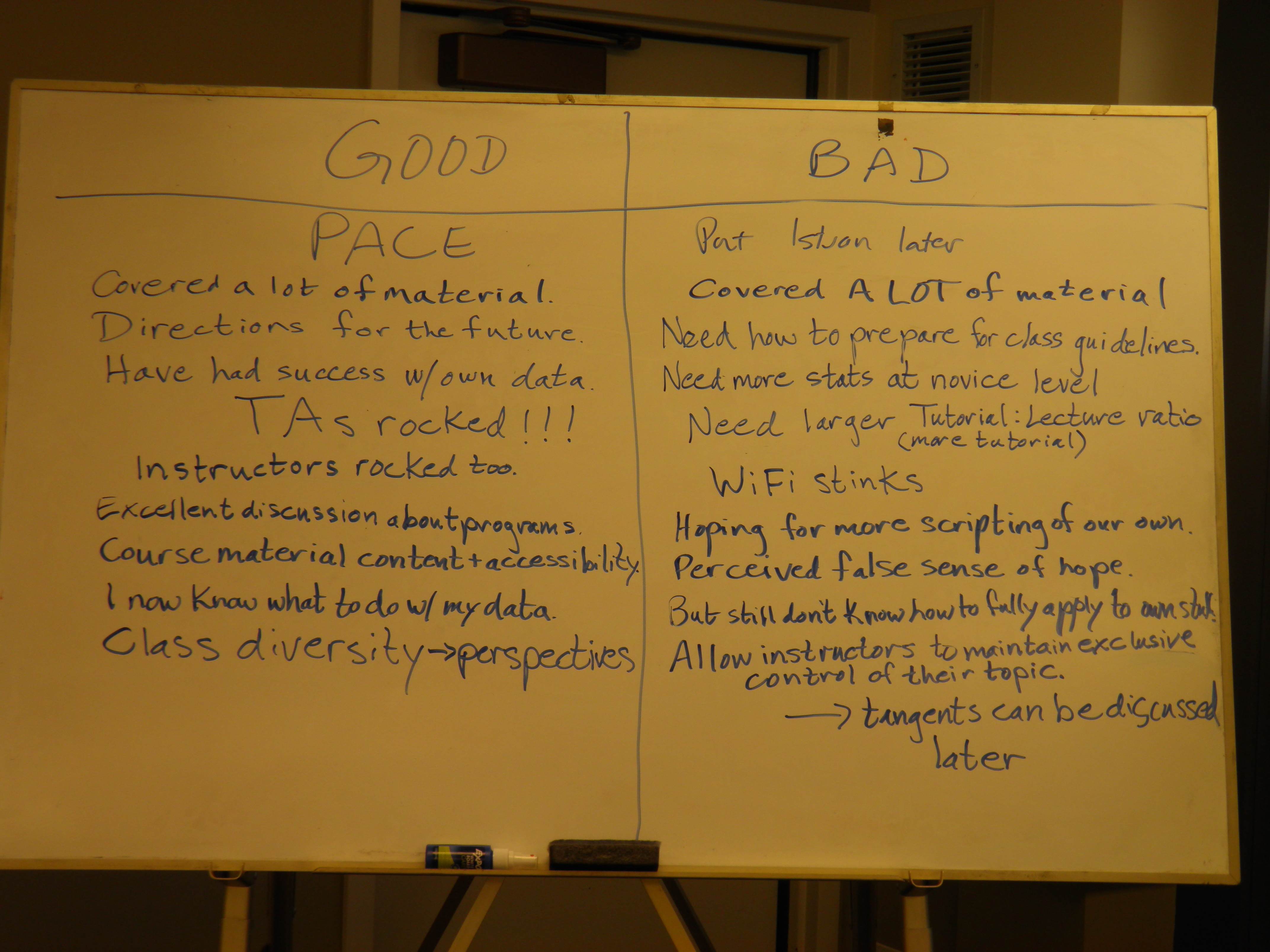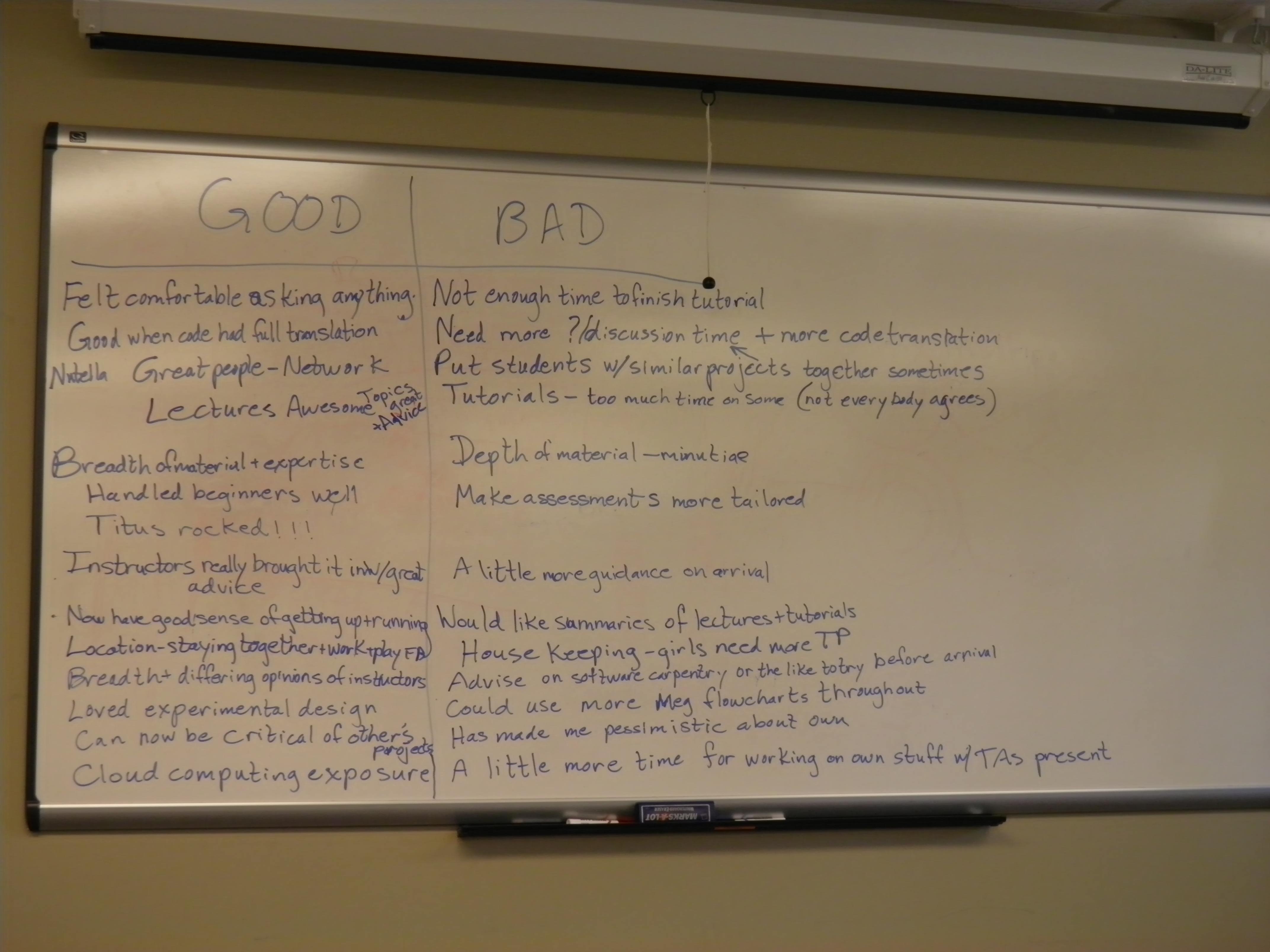The fifth annual Analyzing Next Generation Sequencing Data workshop just finished - #ngs2014. As usual the schedule and all of the materials are openly available.
tl; dr? Good stuff.
We've been running this thing since 2010, and we now have almost 120 alumni (5 classes of roughly 24 students each). The students come from all over the world (although I think we're missing attendees from Africa and Antarctica), and from many different types of institutions, including top tier research universities, biotech, and non-profit research centers. The "students" vary in rank from graduate students and staff to full professors; the age range goes from low 20s to a fair bit older than me.
The class invariably starts with an introduction to cloud computing, followed by a number of step-by-step tutorials through command line BLAST, quality analysis of Illumina data, mapping, and assembly. We cover basic analysis of your data, statistical considerations in sample design and data analysis, automation, version control, R, Python, IPython Notebook, mRNAseq analysis, and a variety of other topics. The students take full advantage of the opportunity to ask an immense variety of questions, ranging from algorithmic and technical to fundamental scientific questions.
It's truly awesome, and I am unreasonably proud of this workshop!
This year the previous workshop faculty and instructors (Ian Dworkin, Istvan Albert, Chris Chandler, Adina Howe) were joined by a newer cohort, including Meg Staton, Matt MacManes, Daniel Standage, Aaron Darling, and Martin Schilling. The younger group of scientists (Chris, Adina, Meg, Matt, Daniel, Aaron, and Martin) make me feel old: they're young, enthusiastic, all about open science, and totally into reproducibility and Software Carpentry and good bioinformatics. Many of them are now junior faculty, which really gives me hope for the future! Of particular note, Adina Howe took the course in 2010 (the first time we offered it) and is now taking a position as a big data biology junior faculty member -- how cool is that!?
Our TAs this year did a fantastic job. Amanda Charbonneau was the overall "cruise director", and Aswathy Sebastian, Will Pitchers, Elijah Lowe, and Qingpeng Zhang served as TAs.
How did the course go this year?
Each year we do an end-of-course discussion where I try to stay quiet as the students dissect all of the bad decisions I made in organizing the course. This year, I took a page from Greg Wilson's handbook and made the students offer up one good thing and one bad thing -- every student had to provide at least one of each, and they had to be non-overlapping. We didn't entirely succeed at getting completely non-overlapping feedback, but the lists are still interesting and informative:


I think my favorite is "Good: covered a lot of material; bad: covered A LOT of material!" although "I am worried that we now have a false sense of hope" comes in as a close second. Meg Staton should feel proud that one of the comments boiled down to "more Meg", although it came out as "more of Meg's flowcharts." And of course there's the always popular opinion that "if only you'd given us more to read up front, we'd have come better prepared", which in my experience is an incredibly over-optimistic lie, if well intentioned :).
Assessing the workshop
This is now the third year we've run assessments on the workshop. Our expert assessment company, StemEd LLC, hasn't yet finished the assessment report for 2014, but you can read the 2012 and 2013 evaluations here and here. These aren't complete assessments -- we are still working on processing the long-form answers -- and they are somewhat superficial, but overall paint a very positive picture of the workshop. This is in line with what we hear from the students both informally throughout, as well as more formally at the end-of-workshop discussions.
One thing that surprised me this year (and I'm mentioning it because I wouldn't have noticed if someone hadn't said it for their "one good thing") was that people commented very positively on the diversity of students, who came from all over the world (we covered all but two South American countries!), had many different research backgrounds and interests, and were at many different career stages. While we are in fact tempted to roll dice to choose the students (this year, we accepted 24 of 170 applicants), we actually do spend some time trying to balance the class -- and it seemed to work well this year!
Next years' plans
We are planning to run the workshop against next year, at about the same time and in the same place, but there are some potential complications. (More about those soon.)
The biggest change that I think I'm going to put into place next year is that the first ~5 days will be paced much more carefully. Some people come in with a lot of self-confidence and some solid expertise, while others come in with little of either; the latter group is really sensitive to being overwhelmed, while the former group is usually eager to drink from the firehose (sometimes until they see just how high we can turn up the pressure, hah). I plan to address this by making the first 5 days all about gentle-but-thorough introductions to UNIX, mapping, assembly, and scripting. In my experience, even the people who come in with some knowledge get a lot out of the more thorough introductions. Then in the second week we'll go crazy with a range of subjects.
As part of this change, I may restrict the first week lecturers to trained Software Carpentry instructors. This would include Adina Howe, Meg Staton, and Martin Schilling, as well as myself (although I'd like to offer to pay for other instructors to do the in-person training if they were interested). From what I observed, people who haven't gone through Greg Wilson's training bootcamp are really lacking in an ability to "read" the classroom - for one, they don't pay enough attention to stickies, and for another, they are often too enthusiastic to get to the cool stuff. These instructors are incredibly valuable after people have learned to tread water, but can too easily drown students in the first week. I got a lot of feedback this year that they needed to be introduced more carefully. (There are some people that are just ill-suited to instructing non-experts, but I tend not to invite them -- I'm thinking of the first lecture at another workshop, which (literally) started with "OK, now after compiling and installing my software package, fire up vi and edit the config file to reflect your local system settings. Then run the program on the first demo file XXXX.")
Something else I need to make sure of is that I (or someone) remains heavily involved in the course throughout. This year I was distracted by several different things, including three (!) thesis defenses on main campus that took place during the course, and I didn't bring the intensity. Next year, more intensity (or perhaps a new workshop director ;).
So that's my report for this year.
--titus
Comments !